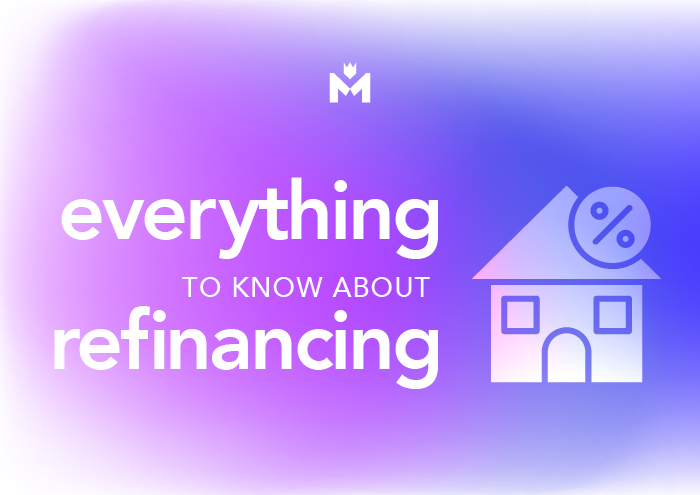Refinancing is an important financial decision that can have a significant impact on your budget and your overall financial situation. If you own a property and are considering refinancing, there are several things you should know before making a decision.
What is refinancing?
When it comes to refinancing, the first thing to understand is what it entails. Refinancing is the process of taking out a new loan to replace an existing loan. In the context of property, this typically refers to taking out a new mortgage home loan to pay off the existing mortgage home loan.
There are a variety of reasons why someone might choose to refinance, including wanting to reduce their mortgage home loan repayment, lower their interest rate, or access equity in their property. As always, everyone’s financial story, literacy, and need is entirely different.
Why refinance a house?
One of the most common reasons people choose to refinance is to take advantage of lower interest rates. If interest rates have gone down since you initially took out your mortgage home loan, refinancing can allow you to lock in a lower rate, which can help save you money in the long run.
It’s important to note that interest rates fluctuate regularly, as we’ve seen in previous rate wars during the COVID lockdowns here in Aotearoa New Zealand, so it’s worth keeping an eye on the market to see if it’s a good time to refinance. Working with a mortgage professional or financial adviser can help you understand the current interest rate landscape and determine if refinancing makes sense for you.
With lower interest rates, refinancing can help lower your repayments. If you’re struggling to keep up with your current mortgage home loan repayment, refinancing can help ease the burden by reducing the amount you owe. This can free up cash flow to use for other expenses or to save for future financial goals. It’s especially useful for people who are experiencing a drop in salary, or are feeling the ever-increasing pinch of the cost of living!
Another reason people choose to refinance is to shorten their loan term. If you’re looking to pay off your mortgage home loan debt faster, refinancing to a shorter-term loan can help you do just that.
For example, if you currently have a 30-year mortgage and have been making payments for several years, refinancing to a 15-year mortgage can help you pay off your debt in half the time. This option can help you save money in the long run, as you’ll pay less in interest over the life of the loan.
If you’ve built up equity in your property, refinancing can also allow you to access that equity. Equity is the difference between what you owe on your mortgage and the current value of your property.
What are the risks of refinancing?
While refinancing can offer many benefits, it’s important to consider the risks involved as well. One of the biggest risks of refinancing is the potential for higher costs. Refinancing can involve a variety of fees and costs, including going through lawyers again, or breaking a loan term. These costs can add up quickly and may offset the savings you would get from a lower interest rate or lower repayment. It’s important to carefully review the costs associated with refinancing to ensure it’s a financially sound decision!
Another risk of refinancing is the potential for a longer loan term. While refinancing can help lower your repayments, it can also extend the length of your loan. If you’ve been paying your mortgage for several years and refinance to a new 30-year loan, for example, you’ll be adding more years of payments to your overall debt. This can result in paying more in interest over the life of the loan, so it’s important to consider the long-term implications of extending your loan term. However, again this is sometimes a short-term financially savvy move for people wanting to lower their repayments so they have breathing room.
Finally, refinancing can also result in a loss of equity if property values decline. If you’ve borrowed against the value of your property through a refinance, for example, and the value of your property drops, you may owe more on your mortgage than your property is worth. This is known as being “underwater” on your mortgage and can be a significant financial burden. Work with a trusted mortgage broker or financial adviser to ensure you’re making the best decision for your unique financial situation.
What are my refinancing options?
When it comes to refinancing, there are several options to consider. The most common type of refinancing is a rate and term refinance, which involves replacing your current mortgage with a new mortgage that has a lower interest rate or different terms, such as a shorter loan term. Another option is a ‘cash-out refinance’, which allows you to borrow against the equity in your property and receive cash at closing. This can be a good option if you need funds for home improvements, debt consolidation, or other expenses.
Refinancing your mortgage can be a smart financial move, but it comes with risks. Before making a decision, it is important to carefully consider your goals, your current financial situation, and the potential costs and benefits of refinancing. With careful research and planning, you can make an informed decision that helps you to achieve your financial goals and secure your financial future.
To summarise…
Ultimately, the decision to refinance your property should be based on your unique financial situation and goals. It’s important to weigh the potential benefits and risks of refinancing, and to work with a mortgage broker or financial adviser to determine if it’s the right option for you. By carefully considering your options and working with a trusted home loan or mortgage professional, you can make an informed decision that helps you achieve your financial goals and provides greater financial stability in the long run.
Please note all information in this document is generalised advice and not specific financial advice. Get in touch with a financial adviser for advice personalised to you.




